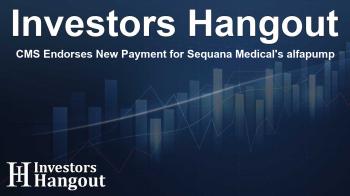CMS Endorses New Payment for Sequana Medical's alfapump

Significant CMS Approval for Sequana Medical's alfapump
Sequana Medical NV is making significant strides with its alfapump system, especially following the recent approval from the Centers for Medicare and Medicaid Services (CMS). This new advantageous ruling, part of the Final Rule for Fiscal Year 2026, announces the inclusion of a New Technology Add-On Payment (NTAP) specifically for the alfapump system when utilized in hospital inpatient settings. This payment is set to be effective from October 1, 2025.
Understanding the New Technology Add-On Payment (NTAP)
The NTAP program is designed to encourage the adoption of new technologies by ensuring that hospitals can receive adequate reimbursement for implementing such innovations. For the alfapump, the potential compensation can reach up to $21,450. This amount is provided in addition to the standard Medicare Severity Diagnosis Related Group (MS-DRG) payment, which helps alleviate some of the financial burdens associated with introducing groundbreaking medical technologies.
Alfapump’s Role in Treating Ascites
The alfapump system is particularly noteworthy as it addresses the treatment of recurrent or refractory ascites caused by liver cirrhosis. This condition can lead to severe complications if left untreated. The innovative device, approved by the US FDA, is the first of its kind, functioning continuously to remove excess fluid from the abdomen into the bladder, allowing it to be subsequently eliminated naturally by urination. To date, over 1,000 alfapump systems have been successfully implanted, marking a new era in the treatment of this challenging condition.
Commercial Launch and Impact on Patients
The company is also on track to launch the alfapump commercially in the US by the third quarter of 2025. This phase will primarily focus on liver transplant centers, which are crucial in treating this specific patient demographic. Martijn Blom, Chief Commercial Officer of Sequana Medical NV, emphasized the importance of this reimbursement approval, stating that it plays a pivotal role in ensuring Medicare beneficiaries can access this innovative treatment.
Research and Clinical Insights
The alfapump's PMA approval in December 2024 followed a successful phase of clinical trials, particularly the pivotal POSEIDON study. This study demonstrated significant effectiveness in treating patients, with clinical results showing considerable improvements in quality of life and reduced need for invasive procedures like therapeutic paracentesis. The data showcased that patients experienced a virtual elimination of the need for large-volume paracentesis at the 24-month mark, confirming the alfapump’s efficacy.
Future Market Outlook for Alfapump
The market for treating recurrent ascites due to liver cirrhosis is projected to experience considerable growth, with an estimated increase from approximately 70,000 patients in 2025 to around 130,000 by 2032. This growth is driven largely by the rising incidence of conditions like NASH/MASH. With an anticipated total market opportunity exceeding $2 billion by 2025, and forecasted to surpass $5 billion by 2035, Sequana Medical is positioned to take advantage of this expanding space.
About Sequana Medical NV
Sequana Medical NV is recognized as a pioneer in developing treatments for fluid overload—a serious complication frequently seen in patients suffering from liver disease, heart failure, and cancer. Their proprietary platforms, including alfapump and DSR, are tailored to provide effective treatment options for patients who exhibit resistance to diuretics, ultimately aiming to enhance clinical outcomes and reduce healthcare costs.
For those interested in learning more about Sequana Medical's innovations or contacting the company for further inquiries, they can reach out to their investor relations team via email at IR@sequanamedical.com or call +32 (0)9 496 17 27.
Frequently Asked Questions
What is the alfapump system?
The alfapump is a revolutionary medical device designed to manage fluid buildup due to liver diseases, allowing for the automated removal of excess fluids from the abdomen.
How does the NTAP benefit hospitals?
NTAP provides financial support for hospitals using new technologies, such as the alfapump, ensuring they receive adequate reimbursement for associated costs.
When will the alfapump be available in the US?
The alfapump is scheduled for a commercial launch in the US in the third quarter of 2025, targeting liver transplant centers.
What are the clinical benefits of the alfapump?
Clinical trials have shown that the alfapump significantly improves patient quality of life and reduces the need for invasive procedures like therapeutic paracentesis.
How is Sequana Medical expanding its market reach?
Sequana Medical is focusing on US liver transplant centers for its alfapump and is actively identifying opportunities in the growing market for liver-related treatments.
About The Author
Contact Dominic Sanders privately here. Or send an email with ATTN: Dominic Sanders as the subject to contact@investorshangout.com.
About Investors Hangout
Investors Hangout is a leading online stock forum for financial discussion and learning, offering a wide range of free tools and resources. It draws in traders of all levels, who exchange market knowledge, investigate trading tactics, and keep an eye on industry developments in real time. Featuring financial articles, stock message boards, quotes, charts, company profiles, and live news updates. Through cooperative learning and a wealth of informational resources, it helps users from novices creating their first portfolios to experts honing their techniques. Join Investors Hangout today: https://investorshangout.com/
The content of this article is based on factual, publicly available information and does not represent legal, financial, or investment advice. Investors Hangout does not offer financial advice, and the author is not a licensed financial advisor. Consult a qualified advisor before making any financial or investment decisions based on this article. This article should not be considered advice to purchase, sell, or hold any securities or other investments. If any of the material provided here is inaccurate, please contact us for corrections.

